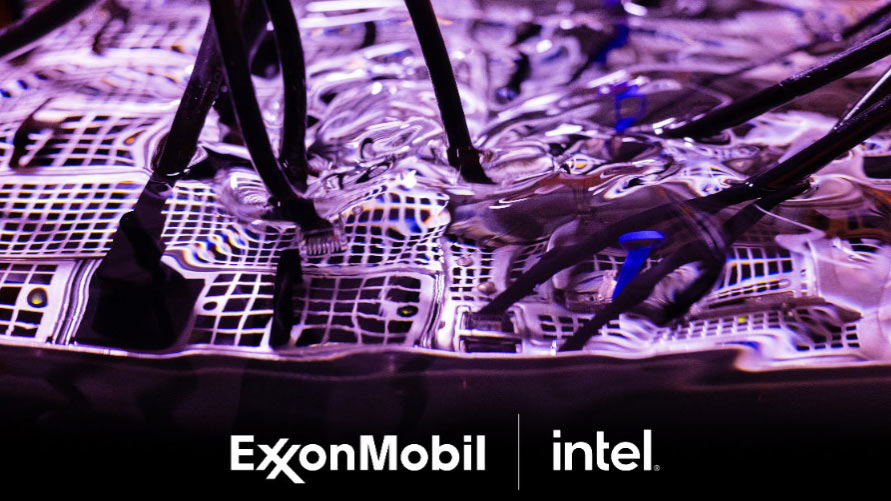Intel and ExxonMobil working on advanced liquid cooling — laying groundwork for 2000W TDP Xeon chips
ExxonMobil produces PFAS-free immersion cooling fluids.

Today, Intel and ExxonMobil announced they will collaborate to develop advanced liquid cooling technologies. The big tech and big oil pairing will work closely during their multi-year collaboration to "develop and certify next-generation, energy-efficient, liquid-based cooling technologies" writes ExxonMobil in the press release. Intel wants significant improvements in order to cool future Xeon CPUs with up to 2,000 watts TDPs, which are scheduled to appear between now and 2030.
ExxonMobil is best known as an oil company, but it's also one of the largest chemical businesses worldwide. One of its perhaps surprising strengths is in providing advanced fluids for liquid immersion cooling solutions. It makes various PFAS-free immersion cooling products offering different grades, viscosities, and flash points.
In the press release, ExxonMobil says it hopes the new collaboration will aid the industry’s transition to liquid cooling. A canned statement from Intel echoes those hopes and explains that turnkey solutions for liquid cooling that provide "significant energy and water savings" are among the goals of the partnership.
ExxonMobil makes some bold claims for its immersion cooling fluids. Its dielectric fluids are said to offer superior thermal management while increasing hardware lifespan and lowering costs. The trio of properties highlighted seem handpicked to appeal to data center operators. Sustainability is also stressed, with ExxonMobil pointing to reduced energy use (measured by Power Usage Effectiveness (PUE)), reduced water consumption, and increased rack density.
It looks like ExxonMobil has the fluid side of things sewn up, so Intel just needs to work on the turnkey immersion cooling tanks and chassis. We've previously reported on Intel’s liquid and immersion cooling investments and projects. In May 2022 we noted that the firm would invest $700 million to design next-generation immersion liquid cooling solutions. Last year we reported on Intel researchers creating immersion cooling systems leveraging intriguing technology such as "3D vapor chambers embedded in coral-shaped heat sinks." Similarly, we heard it was testing out "tiny jets, adjusted by artificial intelligence, that shoot cool water over hot spots in the chip to remove heat."
In short, Intel seems to have plenty of ideas that could complement the use of ExxonMobil's best fluids. There's no clear timeline of when the partnership will finalize the hardware and liquid side of things, but presumably Intel wants the solution to be ready for the 2,000W TDP Xeons it showed on roadmaps at February’s IFS Direct Connect event.
Get Tom's Hardware's best news and in-depth reviews, straight to your inbox.

Mark Tyson is a news editor at Tom's Hardware. He enjoys covering the full breadth of PC tech; from business and semiconductor design to products approaching the edge of reason.
-
JTWrenn We need to lower power usage from datacenters and instead they are just working on how to handle higher power usage. Would much rather see them pair with a material company to make lower energy usage solutions.Reply -
Amdlova Reply
They are lowering the foot print of data center... with a 2000w cpu can remove lot of hacks and additional heat and power loss from power supplies.JTWrenn said:We need to lower power usage from datacenters and instead they are just working on how to handle higher power usage. Would much rather see them pair with a material company to make lower energy usage solutions.
2000w cpu can heat a small sized house, You can build data center's close to neighborhoods and trade some heat energy and be maximum green possible.
It's a big win when big data center can heat a small town in some place like Iceland :) -
thestryker Reply
2000W might seem bad, but it's all about compute density. Think of it this way if a 2P 2000W CPU based server can replace at least 6x 2P 350W CPU based servers there is going to be a large amount of power savings. Immersion cooling is usually more efficient than liquid or air as well so if they can get a non-PFAS based system working that should be more power savings.JTWrenn said:We need to lower power usage from datacenters and instead they are just working on how to handle higher power usage. Would much rather see them pair with a material company to make lower energy usage solutions. -
dalek1234 2000 Watts? So instead of making CPUs more energy efficient (something Intel is seriously lacing in and doesn't have much of a future as a company without doing so), they are preparing for CPUs that suck up even more power. Does that mean they gave up on making their CPUs considerably more power-efficient? Kind of sounds like it to me.Reply
